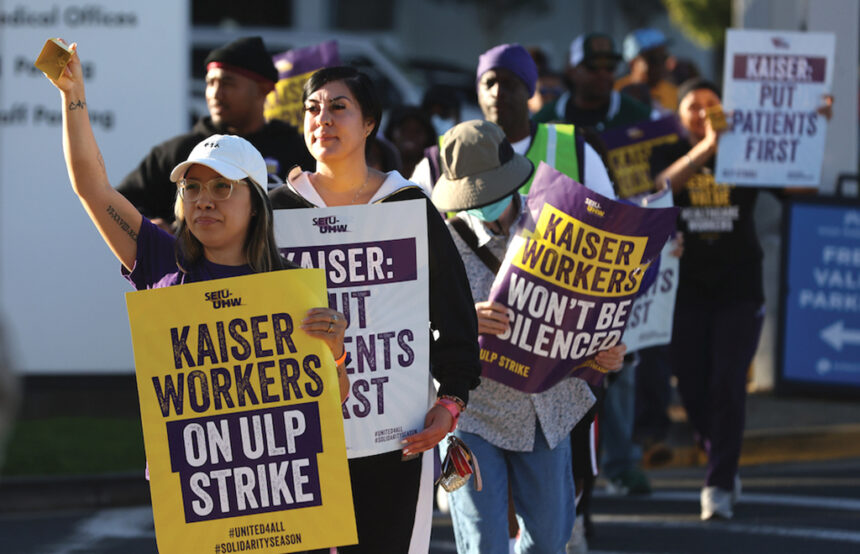April 17, 2023
Health system Kaiser Permanente, the largest private employer in California, announced it had kicked off negotiations with the Coalition of Kaiser Permanente Unions to reach a new collective bargaining agreement. At the center of the Coalition’s negotiations are the need for better working conditions and wages perpetuated by an ongoing staffing crisis.
The company said it looked forward to “coming together with our Coalition partners and rolling up our sleeves to find new ways to tackle these challenges.”
April 18-September 14
The company posted several announcements to its “negotiations” website, including video messages and updates on specific bargaining sessions and its goal of hiring 10,000 new Coalition-represented employees by the end of 2023.
September 15
After approximately 65,000 of the Coalition’s 85,000 members voted to authorize a strike, Kaiser Permanente posted a statement addressing several “misleading” union claims and emphasizing it was well-prepared to manage a strike, should one occur.
The company urged employees to reject calls for a strike and focus on providing high-quality care and service to its members “who need us to be there for them.”
September 22
The Coalition released a statement saying it had warned Kaiser Permanente executives that 75,000 workers would strike if an agreement was not reached by September 30, when its contract expired.
Kaiser Permanente responded with a press release that focused heavily on COVID-19 and how the company’s people “stuck together” to overcome the pandemic’s many challenges.
“We have been there for our people during the pandemic, and we will be there for them going forward,” it said.
September 25–October 2
The company released numerous updates about its negotiations, including its enhanced proposal to the Coalition.
“While these plans to strike are disappointing, we remain committed to reaching an agreement that is good for our employees, our members and our organization, and we will continue to bargain in good faith with the Coalition,” it stated.
October 5
One day after the Coalition began its strike, marking the biggest healthcare strike in U.S. history, Kaiser Permanente said in a statement it was “working hard to reach an agreement.”
The company also offered some positives, announcing that it had hired 10,000 Coalition-represented employees three months ahead of its year-end goal and highlighted that its hospitals and emergency departments remained open.
“Members who need urgent or timely medical care should continue to seek it at our hospitals and medical facilities. A strike should not dissuade anyone from seeking necessary care,” the statement concluded.
October 6
The Coalition ended its three-day strike, as required under federal rules, and both sides in the labor dispute agreed to resume stalled contract talks the following week.
October 13
Kaiser Permanente and the Coalition jointly announced they had reached a tentative four-year agreement, bringing nearly seven months of negotiations to a close.
The deal, which would increase wages, expand job training and improve performance sharing plans, still needed to be ratified by union members.
November 9
The Coalition-represented employees voted to ratify the tentative deal, effective October 1, 2023, through September 30, 2027.
Conclusion: Hit
Labor relations can quickly become hostile. However, Kaiser Permanente focused its messaging around “coming together” to find a mutual solution, just as its people did during the pandemic. It followed through on that idea not only by reaching a new deal, but also by announcing it alongside the Coalition.
Takeaways
1. Center your labor relations comms. Kaiser Permanente established a dedicated negotiations webpage, where it posted frequent updates and was able to clarify any developments on its own terms.
2. Remember all your stakeholders. The company communicated that it was prepared for a potential strike and informed people how to access care during the 72-hour work stoppage.
This article originally appeared on PRWeek US.







